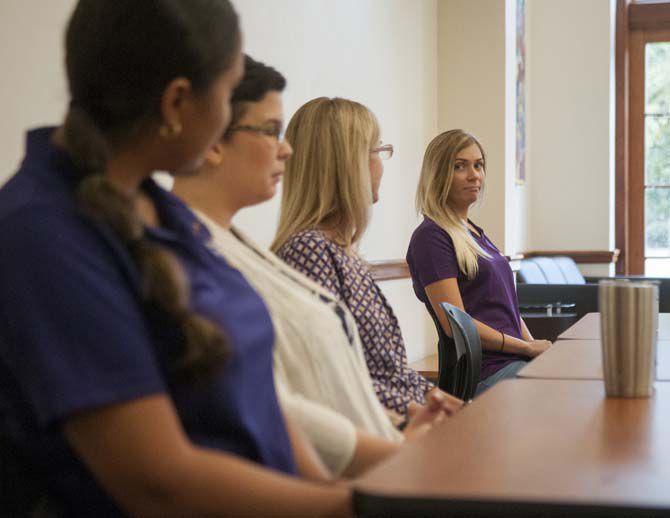The Roger Hadfield Ogden Honors College hosted an all-female veterans panel in preparation for the arrival of the author of Soldier Girls, a book about three women and their experiences serving in the military.
Petrayris Huertas, a veteran on the panel, is an accounting senior. She served active-duty in the U.S. Marine Corps for four years working with payroll.
Kat Hightower served as a registered nurse, specializing in critical care, in the U.S. Army for 13 years before retiring as a Major. She is a landscape architect student working toward her third degree.
Hightower had military exposure from family all her life. While she worked to put herself through school and become a registered nurse, Huertas said the military was her way out of the bad neighborhoods of Chicago and her way to make something of herself.
Katherine Simmons, a chemical engineering junior, said she did not have the money to go to school after graduating high school and did not know what she wanted to do, so she joined the military. She served in the U.S. Army as an intelligence analyst.
Kayla Kappel joined the U.S. Air Force after high school because she wanted to help make a difference and help those fighting for us. She served for six years, four of them full-time, working for Intelligence and then finance. She worked with an Air and Space Operations Center, helping people to and from deployments and with the Embassy overseas, helping people gain citizenship. She is an environmental engineering student.
Each of the veterans faced their own forms of discrimination for being women in the military and had to work even harder to show how serious they were. Huertas described the Marine Corps as the “boys’ club” which was made evident by the men in the corps. Simmons said being surrounded by men in the Army brought about attention she was not used to.
Working as a nurse, Hightower said about half of the nurses were men.
“It’s really frustrating [that perception] that female Marines or female veterans [have this] persona that they look a certain way or fit a certain criteria,” Huertas said. “We’re all different.”
Huertas said many visits to the Veterans Affairs Hospital were accompanied with assumptions that she was there for her husband, who also serves, rather than herself.
Simmons said her husband is also in the military, so when people ask about her and her spouse, they assume she is only in the military as support for her husband. She described it as a “sore spot for most female veterans.”
Hightower said soldiers appreciated her for what she did as a nurse, but civilians always directed their questions to her husband, who is a West Point graduate.
“Don’t underestimate us,” Kappel said.
All the veterans said one of the biggest adjustments to civilian life is the lack of structure they became accustomed to. However, their time in the service taught them important leadership skills and a sense of humility, pride and purpose.
They all said they miss the service but are working diligently to obtain their degrees and get back to the real world “making a paycheck.” They said they take pride in being inspirations for women to work hard and pursue a career in the military.
“If a woman can do it, go for it,” Huertas said.
LSU Honors College hosts all-female veterans panel
September 1, 2016
Petrayris Huertas, Kat Hightower, Kayla Kappel and Katherine Simmons participate in a panel of female veterans who speak to students about their experience in the military on Thursday, September 1, 2016 in the West LaVille library.
More to Discover








